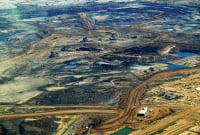Support strong Canadian climate journalism for 2025
These days, the financial news section features glowing reviews of the oil and gas industry’s quarterly profits. Meanwhile, in the current events section, we see the affordability crisis being discussed, and in breaking news, we will soon see headlines announcing another intense wildfire season and the heartbreaking consequences of climate disasters.
Let’s connect the dots between these news stories. Fossil fuels are the leading cause of climate change. Climate change increases the frequency and severity of extreme weather events, like droughts and last year’s devastating wildfire season. Climate scientists and forestry professionals have repeatedly explained that increased unseasonable dryness from climate change leads to fires that burn hotter, longer and more easily — and spread faster. This has huge costs and consequences.
In 2023, Canada’s oil and gas companies’ cost to society from their pollution was estimated at $52 billion. These calculations were made using the Canadian government's social cost of greenhouse gas emissions analysis.
Given the costs of climate change, and the exorbitant profits of those peddling the literal fuel to the fire, shouldn’t the oil and gas industry pay its fair share of the damage?
In 2023, four of the top oil companies in Canada (Cenovus, Imperial Oil, Suncor and Canadian Natural Resources) had a combined annual profit of over $25 billion. While that is less than the record-breaking 2022 profits of $33.7 billion, it is still the second most profitable year in the history of the oilpatch.
Cenovus, Imperial Oil, Canadian Natural Resources and Suncor are part of a growing choir of fossil fuel industry advocates who claim that they are now willing to tackle the climate crisis. In advertising campaigns, they position themselves as your friendly neighbourhood good-guy energy providers. Surely then, they must be investing heavily in emissions reductions and diversifying their business to provide clean energy for customers. That's what a good energy provider would do.
But that isn’t the case. Our review of the annual reports of these four companies indicates they collectively spent over $16 billion last year to expand oil and gas extraction, thereby increasing their contribution to climate change. Suncor even sold off its wind and solar assets for a gain of $302 million at the start of 2023 and cut 1,500 jobs while paying the new CEO Rich Kruger $36.8 million in his first year.
Given that these companies are doubling down on oil and gas expansion, rather than reinvesting even a small margin of their profits in real climate solutions, the federal government should include a windfall tax when it delivers its budget today and use those funds to increase government climate action.
It’s not too late for the government to ensure that the fossil fuel industry pays its fair share. A windfall tax on oil and gas companies, similar to the ones in Europe and the U.K., would help rein in their excessive profits and could help deliver climate solutions that need financial support from the government. Analysis from the Parliamentary Budget Office estimated that applying the Canada Recovery Dividend to oil and gas profits in 2022 would have generated $4.2 billion in one year alone. Isn’t it time the polluters actually paid for the mess they make?
If Canada were to truly embrace urgent and necessary climate action, the taxed funds could be directed at realistic and scalable climate solutions. These include community-led renewable energy, upgrading our electricity grids, ending energy poverty through direct support for home energy efficiency upgrades and deep retrofits, and committing to reliable operating funding for public transit. As Canadians struggle with the affordability crisis, implementing these kinds of climate solutions can lift financial burdens while enhancing community resilience.
“Canada tackles the climate crisis by making polluters pay their fair share” — now that’s the headline we want to see in all sections of Canada’s newspapers.
Emilia Belliveau has worked on climate and environmental justice issues since 2012 as a community organizer, academic researcher, campaigner with environmental non-profits and as a policy analyst in the British Columbia Ministry of Energy. Before joining Environmental Defence, she worked with remote First Nations in B.C. to accelerate the transition off diesel with community-led renewable energy projects and energy efficiency. Emilia holds a master’s degree from the University of Victoria (UVic). At UVic, she was involved with the Corporate Mapping Project, which investigated how corporate power is organized and exercised by the fossil fuel industry.






Comments
I agree with this opinion piece but am pretty sure there will be no windfall tax for oil and gas companies in today's budget. I am shocked to read that, "In 2023, Canada’s oil and gas companies’ cost to society from their pollution was estimated at $52 billion." (!)
How bad does it have to get before we collectively do something substantial about Climate Change? Right now, it seems that Canada is going to head backwards, due to backlash from Conservative governments supported by the oil and gas industry.
Thanks Emilia - the Social Cost of Carbon link was especially helpful.
Another way to look at the social cost of carbon is through lives lost to heat per Mt of CO2 emitted. It's 226. We need that windfall tax.
Mortality Cost of Carbon: https://www.nature.com/articles/s41467-021-24487-w
Paul
For an industry that has existed for little more than 100 years oil and gas has wrought more long lasting damage than almost anything else of human contrivance. In truth, fossil fuels have enslaved the entire planet with its false promise of "cheap energy". It has never been cheap. It only exists on the plus side of the ledger with the endless stream of tax payer subsidies which have enabled its investors and executives to live high on the hog at everyone else's expense.